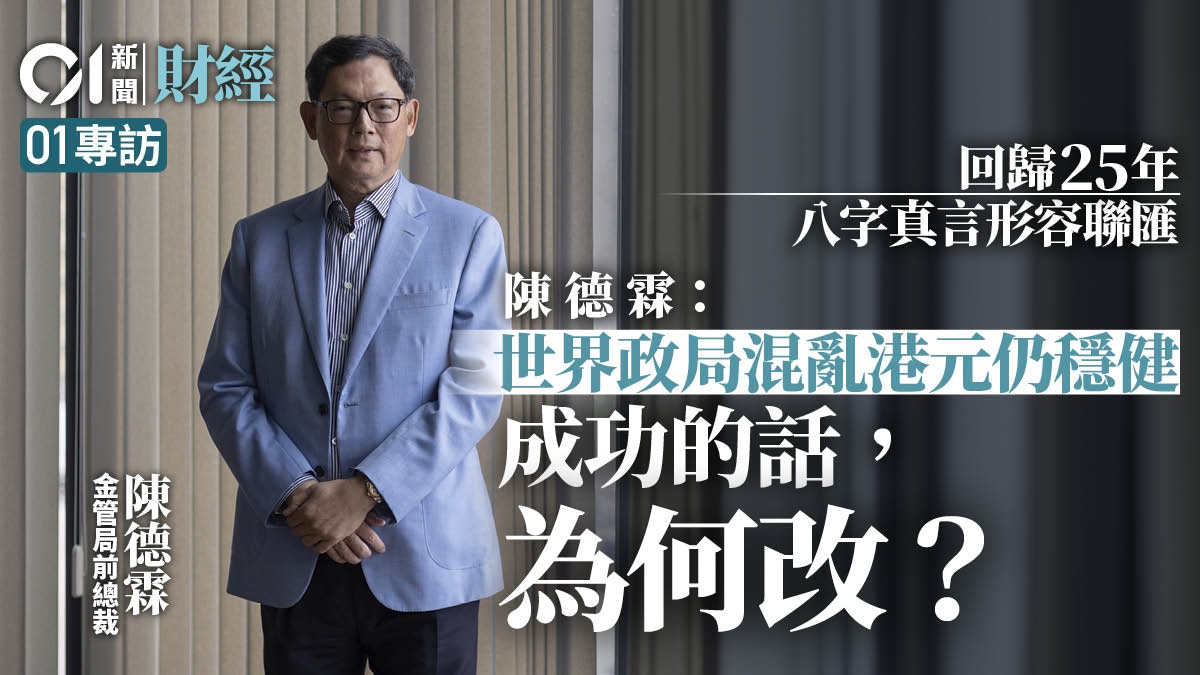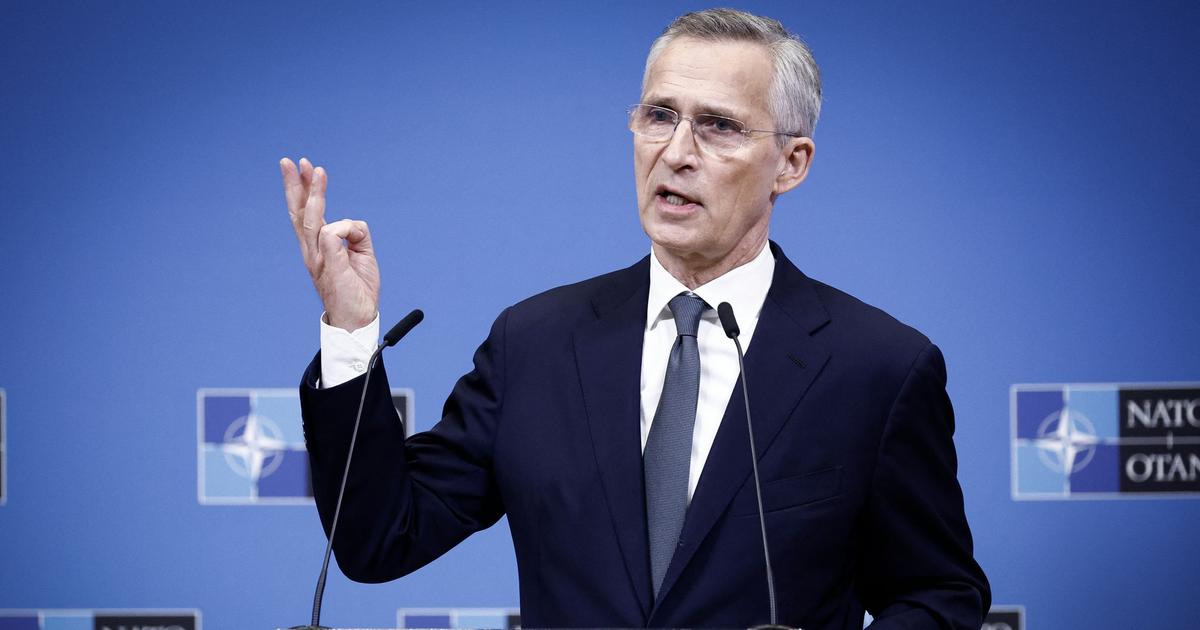In recent years, there have been voices saying that Hong Kong is closely linked with the mainland economy, or it is time to review the linked exchange rate system, including whether it should abandon the peg with the US dollar and instead peg it with a basket of other currencies, including the renminbi.
Chen Delin, former president of the Monetary Authority, said in an exclusive interview with Hong Kong 01 that the world is moving towards polarization, and Hong Kong is only a small place. A stable exchange rate can make investors one less risk factor to consider. He reiterated that the linked exchange system is "effective. , no need to change!"
In an interview, Chen Delin bluntly said that the linked exchange system is "effective and does not need to be changed." (Photo by Liao Yanxiong)
Both this year and next year will be important milestones for Hong Kong: 2022 will be the 25th anniversary of Hong Kong's return to the motherland, and 2023 will be the 40th anniversary of the establishment of the linked exchange rate system.
The establishment of the linked exchange rate system has helped to establish Hong Kong's status as an international financial center.
The HKMA’s website says: “The linked exchange rate system has been implemented in Hong Kong since October 17, 1983. Through a rigorous, robust and transparent currency board system, the exchange rate of the Hong Kong dollar has been kept stable at 7.75 to 7.85 Hong Kong dollars per US dollar. It is the backbone of Hong Kong’s monetary and financial stability. It has survived multiple economic cycles and is still effective. After several regional and global financial crises in the past, the system has become more stable and reliable.”
However, the system has been in place for nearly 40 years. Some people think that the historical task has been completed, and there are also some "shortcomings", including that Hong Kong does not have the independent ability to actively set the Hong Kong dollar interest rate, and cannot control local inflation by adjusting the interest rate. It is even the culprit of the property market bubble.
After years of use, is there really no room for review?
In an exclusive interview with Hong Kong 01, Chen Delin, former president of the Monetary Authority, summed it up in eight characters: "It works, no need to change it!"
2023 marks the 40th anniversary of the Linked Exchange Rate System.
(file picture)
The Hong Kong dollar had a crisis of confidence in the early 1980s
Back in the early 1980s, China and the United Kingdom were negotiating on the future of Hong Kong. Uncertainty brought about by geopolitics, coupled with the Hong Kong stock market crash in 1981, citizens lost confidence in the Hong Kong dollar, and they sold the Hong Kong dollar in exchange for the US dollar. At that time, the Hong Kong dollar was floating at a floating exchange rate. The system has been in operation for nine years, and the exchange rate of the Hong Kong dollar has depreciated sharply from 6.5 Hong Kong dollars to 1 US dollar in early 1983 to almost 10 Hong Kong dollars to 1 US dollar, resulting in a currency and financial crisis.
Chen Delin once wrote an article, recalling that after get off work, he saw a large supermarket surrounded by citizens. He exchanged Hong Kong dollar cash in his pockets for daily necessities, and food, toilet paper, etc. had been snapped up.
Later, the Hong Kong government launched the linked exchange rate system on October 17, 1983, fixing the exchange rate of the Hong Kong dollar against the US dollar at 7.8, and the crisis of confidence in the Hong Kong dollar gradually subsided.
Indeed, the linked exchange rate system has worked well and has survived the Asian financial crisis in the 1990s and the subprime mortgage crisis in 2008.
However, in recent years, there have been voices of reviewing the system from time to time. For example, they believe that Hong Kong can follow Singapore's example and change its peg to a basket of currencies, and completely abandon the currency board system and set up an independent monetary policy that suits Hong Kong's economic conditions.
The linked exchange rate system has survived the Asian financial crisis in the 1990s and the subprime mortgage crisis in 2008.
(file picture)
More Chen Delin interviews:
The 25th Anniversary of China's Return
The 25th Anniversary of China's Return
The 25th Anniversary of the Return of the People's Republic of China
Geopolitical tensions, financial 'weaponization'
One stone has caused a thousand waves, although many heavyweight officials have reiterated many times that the linked exchange rate is effective and extremely important to stabilizing the cornerstone of Hong Kong’s currency and finance. The Hong Kong dollar is linked to the U.S. dollar for national interests and should not be given up easily.
However, in recent years, the geopolitical situation has become tense again. During the war between Russia and Ukraine, Europe, the United States and other countries have been accused of "weaponizing" finance, through sanctions, freezing Russian assets, and moving most local banks out of SWIFT (Global Bank Financial Telecommunication). Association) to support Ukraine, the market is discussing the possibility of "decoupling" again.
Chen Delin believes that in the face of a new pattern of international relations, Hong Kong people can continue to become an international financial center with the support of the state as long as they maintain their competitiveness.
(Photo by Liao Yanxiong)
In fact, such financial sanctions were once only "one step away" from Hong Kong.
After the turmoil against the amendment bill, the "National Security Law" in Hong Kong was implemented. The United States took countermeasures, such as sanctioning Chinese and Hong Kong officials, and canceling Hong Kong's "independent customs territory status". The crackdown on the linked exchange system was even put on the stage by the US political circles for options discussion. .
Chen Delin also admitted that the world has become polarized. One is led by Western countries in Europe and the United States, and the other is dominated by China and Russia. There are many "neutral" countries between the two ends. It is in the best interests of one's own country to be close to the side." The existence of the linked exchange rate system seems to be a "contradiction" in the polarization: on the one hand, the Hong Kong dollar is linked to the US dollar and is the world's third largest US dollar foreign exchange settlement center; on the other hand , Hong Kong is also a major offshore renminbi settlement center and plays an important role in the internationalization of the renminbi.
Return to 25 years of major economic data changes
The world's political chaos, Hong Kong dollar assets are still stable
The world political situation is in chaos. Under the impact of social events in the second half of 2019, the subsequent new crown epidemic, and the peripheral war between Russia and Ukraine, Hong Kong dollar assets have not seen a significant flow. Chen Delin believes that the linked exchange rate system plays a role.
He explained that in the financial market, if a country or region's growth is well monitored, funds will flow in, and on the contrary, capital will flow out, and asset prices will fluctuate accordingly. , in addition to asset prices, there is also the risk of exchange rate fluctuations: "If you are worried about exchange rates and asset losses, investors can sell assets, but if (under the linked exchange system), you don't have to worry about exchange rate fluctuations, you can keep your capital low. If you want to worry about the exchange rate at the same time, you will have to sell the Hong Kong dollar.”
He took Japan as an example. The yen has continued to depreciate in recent days. Investors can sell yen assets; or they can sell yen; Selling the yen short: "Japan is such a large industrial country, and should pay attention to the ups and downs of the yen (exchange rate)."
Hong Kong is only a "small place" and should maintain exchange rate stability
He said frankly that the currency market is speculative. When there is a problem in the economy, the market will sell assets and currencies at the same time, which is a double blow to the economy.
Although the exchange rate floats freely, the central bank can set its own monetary policy, but capital flows in and out, and the exchange rate has the opportunity to appreciate or depreciate significantly.
"Effective, no need to change" Chen Delin ended this "old problem" with these eight words: "The exchange rate is the backbone of an economic system. It is not necessary to change if you want to change it. If it works, why should it be changed? Hong Kong has been changing for more than 100 years. The best thing to do is trade and financial intermediary. Do you think that this has been the case for more than a hundred years, so you should change it first? Of course, if you fail to do it, you must reflect on it, but if you succeed, why change it?”







